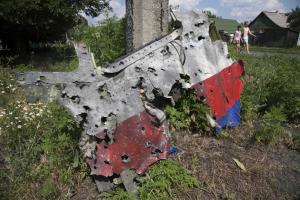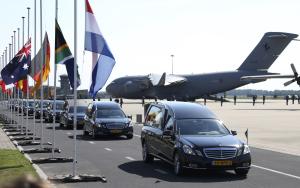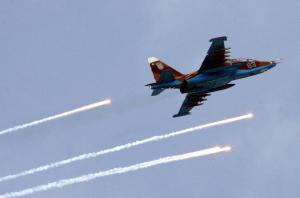By Anton Zverev
DONETSK Ukraine (Reuters) - A powerful Ukrainian rebel leader has confirmed that pro-Russian separatists had an anti-aircraft missile of the type Washington says was used to shoot down Malaysia Airlines flight MH17 and it could have originated in Russia.
In an interview with Reuters, Alexander Khodakovsky, commander of the Vostok Battalion, acknowledged for the first time since the airliner was brought down in eastern Ukraine on Thursday that the rebels did possess the BUK missile system and said it could have been sent back subsequently to remove proof of its presence.
Before the Malaysian plane was shot down, rebels had boasted of obtaining the BUK missiles, which can shoot down airliners at cruising height. But since the disaster the separatists' main group, the self-proclaimed People’s Republic of Donetsk, has repeatedly denied ever having possessed such weapons.
Since the airliner crashed with the loss of all 298 on board, the most contentious issue has been who fired the missile that brought the jet down in an area where government forces are fighting pro-Russian rebels.
Khodakovsky accused the Kiev authorities for provoking what may have been the missile strike that destroyed the doomed airliner, saying Kiev had deliberately launched air strikes in the area, knowing the missiles were in place.
View gallery

Children walk past a piece of wreckage from the Malaysia Airlines jet downed over Ukraine, in Petrop …
"I knew that a BUK came from Luhansk. At the time I was told that a BUK from Luhansk was coming under the flag of the LNR," he said, referring to the Luhansk People’s Republic, the main rebel group operating in Luhansk, one of two rebel provinces along with Donetsk, the province where the crash took place.
"That BUK I know about. I heard about it. I think they sent it back. Because I found out about it at exactly the moment that I found out that this tragedy had taken place. They probably sent it back in order to remove proof of its presence," Khodakovsky told Reuters on Tuesday.
"The question is this: Ukraine received timely evidence that the volunteers have this technology, through the fault of Russia. It not only did nothing to protect security, but provoked the use of this type of weapon against a plane that was flying with peaceful civilians," he said.
"They knew that this BUK existed; that the BUK was heading for Snezhnoye," he said, referring to a village 10 km (six miles) west of the crash site. "They knew that it would be deployed there, and provoked the use of this BUK by starting an air strike on a target they didn’t need, that their planes hadn’t touched for a week."
"And that day, they were intensively flying, and exactly at the moment of the shooting, at the moment the civilian plane flew overhead, they launched air strikes. Even if there was a BUK, and even if the BUK was used, Ukraine did everything to ensure that a civilian aircraft was shot down."
View gallery

The convoy of hearses with the remains of the victims of Malaysia Airlines MH17 downed over rebel-he …
CIVILIAN FLIGHT
Eileen Lainez, a Pentagon spokeswoman, said Khodakovsky's remarks confirmed what U.S. officials had long been saying, that "Russian-backed separatists have received arms, training and support from Russia."
But she dismissed the rebel leader's efforts to blame the Kiev government for the downing of the airliner, calling it "another attempt to try to muddy the water and move the focus from facts."
Washington believes that pro-Russian separatists most likely shot down the airliner "by mistake," not realising it was a civilian passenger flight, U.S. intelligence officials said.
The officials said the "most plausible explanation" for the destruction of the plane was that the separatists fired a Russian-made SA-11 - also known as a BUK - missile at it after mistaking it for another kind of aircraft.
View gallery

A Ukrainian SU-25 fighter jet takes part in military exercises near Mykolayiv, on September 22, 2006 …
"While we may not yet know who actually fired the missile, we have assessed that it was an SA-11 and that it came from a Russian-backed separatist-controlled area," Lainez said. U.S. President Barack Obama's administration has said it is convinced the airliner was brought down by an SA-11 ground-to-air missile fired from territory in eastern Ukraine controlled by pro-Russian separatists.
Other separatist leaders have said they did not bring the Malaysian plane down. Russia has denied involvement.
Khodakovsky is a former head of the "Alpha" anti-terrorism unit of the security service in Donetsk, and one of the few major rebel commanders in Donetsk who actually hails from Ukraine rather than Russia.
There has been friction in the past between him and rebel leaders from outside the region, such as Igor Strelkov, the Muscovite who has declared himself commander of all rebel forces in Donetsk province.
Khodakovsky said his unit had never possessed BUKs, but they may have been used by rebels from other units.
"The fact is, this is a theatre of military activity occupied by our, let’s say, partners in the rebel movement, with which our cooperation is somewhat conditional," he said.
"What resources our partners have, we cannot be entirely certain. Was there (a BUK)? Wasn’t there? If there was proof that there was, then there can be no question."
Khodakovsky said it was widely known that rebels had obtained BUKs from Ukrainian forces in the past, including three captured at a checkpoint in April and another captured near the airport in Donetsk. He said none of the BUKs captured from Ukrainian forces were operational.
While he said he could not be certain where the BUK system operating on rebel territory at the time of the air crash had come from, he said it may have come from Russia.
"I’m not going to say Russia gave these things or didn’t give them. Russia could have offered this BUK under some entirely local initiative. I want a BUK, and if someone offered me one, I wouldn’t turn it down. But I wouldn’t use it against something that did not threaten me. I would use it only under circumstances when there was an air attack on my positions, to protect people’s lives."
He added: "I am an interested party. I am a ‘terrorist’, a ‘separatist’, a volunteer ... In any event, I am required to promote the side I represent, even if I might think otherwise, say otherwise or have an alternative view. This causes real discomfort to my soul."
(Additional reporting by David Alexander in Washington; Writing by Peter Graff; Editing by Giles Elgood and Mohammad Zargham)